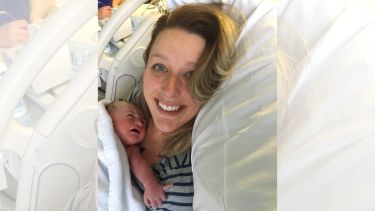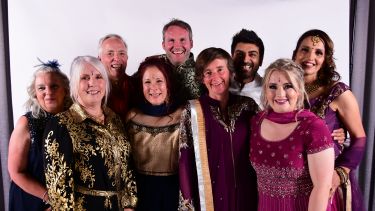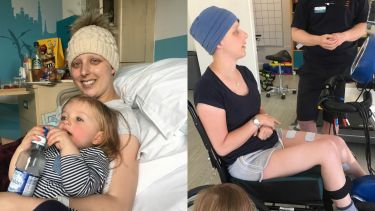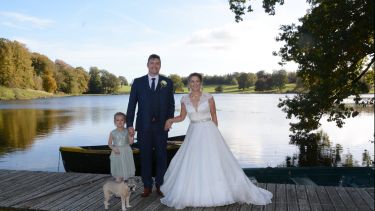Gestational Trophoblastic Disease team raise £11,492 for Jean’s Research Trust with Bollywood themed Ball
On 11th June 2022, the Gestational Trophoblastic Disease (GTD) team at Weston Park Hospital hosted their 3rd GTD Ball. The charity ball raises funds for Jean’s Research Trust at the University of Sheffield. And this year it raised £11,492.
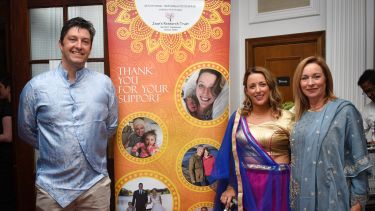
Jean's Research Trust supports the excellent work of Weston Park Hospital and raises awareness of Gestational Trophoblastic Disease. The trust is involved in many research projects to improve the care and treatments given to patients. Patients like Lucy.
Lucy was the guest of honour and key speaker for this year’s event. Lucy was a fit and healthy 29 year old when she gave birth to her first child, Ellena. Three months later, Lucy realised something was not right and visited her GP. She was diagnosed with GTD and went on to receive treatment for over a year under the care of the Northern Gestational Trophoblastic Disease Centre.
During surgery to remove a tumour on her spine, she was told she may never walk again. But, through sheer determination and resilience, Lucy persevered. And in October 2021, she was able to walk down the aisle to marry her partner, James.
Lucy would not be here today if it wasn’t for her extreme resilience, determination and courage. It was an absolute pleasure for our team to support Lucy and play a part in her incredible journey and recovery.”
Kam Singh
Lead Clinical Nurse Specialist at the Sheffield Gestational Trophoblastic Centre and alumna
Read Lucy’s story in full here.
The funds raised by the GTD Ball will help to ensure that the Weston Park Hospital’s Trophoblastic team provide the best possible care for their patients, which is evidence-based. They are currently involved in maintaining an international database which collects information about patients with rare trophoblastic tumours. The information gathered may help doctors treat patients in the future as well as help patients by informing them of treatment practices around the world.
To make a donation, please visit sheffield.ac.uk/giving/donate/online where you should choose “Other” as the Fund Name and “Jean’s Trust” in the “Other” details box.
What is Gestational Trophoblastic Disease?
Gestational Trophoblastic Disease is a rare condition that can develop during pregnancy. The placenta is the organ that is normally formed as part of a healthy pregnancy and it produces hormones that help the baby grow and develop. It is made up of millions of cells called trophoblasts. In trophoblastic disease, there is an abnormal overgrowth of all or part of the placenta. The trophoblastic cells do not grow as they should, and instead form a mass of abnormal cells in the uterus. The growth can be either benign or malignant. A malignant GTD is commonly called gestational trophoblastic neoplasia (GTN).
Following diagnosis, patients in the UK are registered with and followed up by one of three specialist centres, one of which is located at Weston Park Hospital, Sheffield. The Northern GTD centre at Weston Park Hospital registers approximately 600 new patients annually. In most cases, GTD is removed surgically and women are monitored with two-week urine tests to ensure the disease is resolving spontaneously. However, around 15% of those diagnosed with GTD will develop persistent disease (GTN), and therefore will require chemotherapy. There are only two treatment centres in the UK, one in Charing Cross and one at Weston Park and as such women from the North of England and Wales will travel to Sheffield for their treatment. The disease is chemotherapy-sensitive and 98% curative.
Little is known about this rare disease and often patients and their families will not have heard of the disease. Women receiving treatment for GTN face a unique set of challenges associated with the loss of a pregnancy and a cancer diagnosis. It can be a very difficult and challenging time, and having a specialised centre for GTD plays a fundamental role in ensuring these patients are well supported throughout their journey. The specialist centre is very passionate about the work they do and research plays a fundamental part of the service. Internationally, the UK is a world-leader in GTD research and is currently involved in many research projects to improve the care and treatments given to patients. The aim of the GTD team’s work is to ensure they provide the best possible evidence-based care for these patients.
The Sheffield Centre is led by The Director of the service, Medical Oncologist Matt Winter. Lead clinical nurse specialist Kam Singh is responsible for the day to day management of the service, with her team of clinical nurse specialists – Sarah Rollins, Sarah Gillett, Jane Ireson and Joanna Ronskley. Julie Ford, Tracey Byne and Charlotte Shepherd provide the team’s admin support. The team also works very closely with other specialities including clinical chemistry, radiology and histopathology.
Lucy’s Story
In November 2016, Lucy was 29, fit and healthy and working as a dental nurse. She had just given birth to her first child, Ellena.
3 months later, Lucy visited her GP with heavy bleeding. After a scan, she was told that she had placental cells in her womb. After being rushed to hospital of a suspected miscarriage, Lucy was informed that she may be experiencing a molar pregnancy, and if so, it was unlikely to be cancerous.
In early 2017, Lucy was registered with the Northern Gestational Trophoblastic Disease Centre at Weston Park Hospital in Sheffield. She continued to experience pain and heavy bleeding. She was given the devastating news that she had choriocarinoma, a rare pregnancy related cancer. And it had spread to her lungs and brain.
After her diagnosis, Lucy began a six-month treatment of chemotherapy. The intensive chemotherapy caused complete hair loss, nausea, tiredness and weakness. And Lucy was unable to care for her baby on her own. In October 2017, she had a hysterectomy and more chemotherapy after finding out the cancer was likely growing.
On Christmas Day 2017, she experienced severe back pain which progressively got worse between Christmas and New Year. On New Year’s Eve, Lucy collapsed in pain, unable to walk. As soon as she arrived at her local hospital, they knew it was serious and immediately transferred her to the Northern General Hospital in Sheffield. An MRI scan showed that the cancer had returned to her brain and lungs. She had immediate surgery to remove the tumour in her spinal cord. Chemotherapy was resumed immediately with the specialist nurses at Weston Park Hospital. But Lucy was told she may never walk again.
Determined to recover, Lucy was transferred to STEPS Rehabilitation. From the moment she arrived Lucy felt like she was at a ‘home away from home’. Lucy’s family, including her partner James and daughter Ellena, could visit and take part in her sessions. Lucy was able to go home on weekends and was finally discharged for Christmas 2018. After having spent almost a year away from her home and family.
With the help of physiotherapy sessions, Lucy can now walk with the help of a stick. She was able to walk down the aisle on 21st October 2021 to marry her devoted partner, James. And Ellena joined her mum as her bridesmaid. Two of her specialist nurses had the honour of watching her walk down the aisle. It was a very emotional occasion shared by her close family and friends.
Lucy remains in recovery and continues on lifelong monitoring with her specialist centre. Her specialist nurses attribute her resilience, determination and courage, which got her through this incredible journey.
Lucy’s amazing journey would not have been possible without the care and support of Sheffield’s Gestational Trophoblastic Disease (GTD) team at Weston Park Hospital. You could help others like Lucy by donating to Jean’s Research Trust today.

